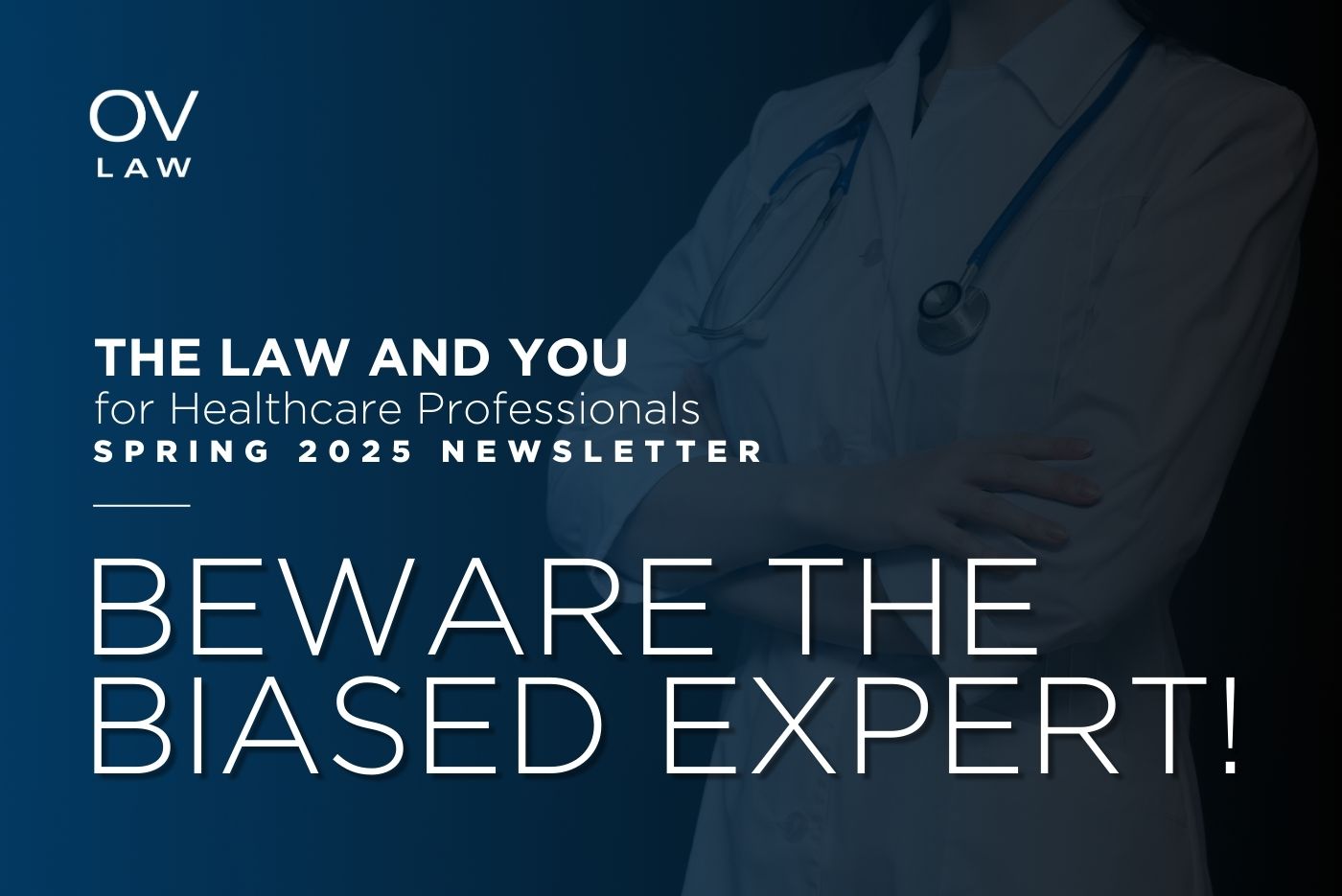Beware The Biased Expert!

Whether you are a physician, a chiropractor, an optometrist, a psychologist, a physiotherapist, an occupational therapist, a speech language pathologist, social worker, or work in any other specialized area of healthcare or rehabilitation, you may one day be called upon to give “expert” evidence at trial for a patient who suffered serious injuries in a traumatic incident, whether it be a motor vehicle collision or some other type of accident.
In this newsletter, we will provide you with a brief primer on recent developments in the law on expert evidence.
The legal landscape with respect to expert witnesses in personal injury cases has evolved significantly over the recent years. Judges are now, more than ever, actively involved as gatekeepers when considering whether a particular witness should be allowed to testify as an “expert”. Experts play an important role in litigation because they are the only witnesses who are allowed to express their opinion on certain key issues in the case. Experts can make or break a case for a litigant.
While most of you reading this newsletter may be called upon to give evidence as a “treating” healthcare provider or as a fact witness, some of you may receive a request from the patient’s lawyer to provide a report that contains opinion evidence. Some of the issues you may be asked to opine on include issues such as diagnosis, prognosis, employability, future care needs, causation, etc. Every healthcare provider must be cautious when entering into this expert arena because of the potential scrutiny it could attract. The golden rule for experts is to be fair, objective and impartial. Ultimately, they owe a duty to the court to be fair and impartial and judges are taking a closer look at experts that only provide evidence for one side, or make most of their living conducting medical assessments, or come across as advocates for the party who hired them.
As Justice Jane Ferguson stated in the 2022 decision of Denman v. Radovanovic, expert evidence is a “key element in the search for truth” but “it may also pose special danger.”
“For that reason, the courts have progressively tightened the rules of admissibility and enhanced the trial judge’s gatekeeping role.” In that case, Justice Ferguson went on to grant a motion excluding the evidence of a vascular neurosurgeon on the ground of bias. She found that the expert was not impartial and was unable and unwilling to comply with his duty of impartiality to the Court due to his open unwillingness to testify for plaintiffs in medical malpractice matters and his failure to disclose a pre-existing relationship with one of the defendant physicians. More particularly, the expert witness had a history of retainer exclusively by the defence; had a long association with counsel in the case; had personal involvement with a party; filed reports that were “grossly incomplete” and “replete with advocacy and argument”; gave evidence in other cases that lacked objectivity and impartiality; had a history of giving evidence that had been successfully attacked; gave differing opinions on “near identical subject matter” in different cases; voiced “unsubstantiated opinions” and improperly qualified statements, with unclear or no demarcation between fact and opinion; and expressed conclusions that did “not remotely relate to the available factual foundation or prevailing special knowledge.”
Even where judges have not excluded expert evidence as biased, they have been quick to express their displeasure with and reject expert testimony that falls short of impartiality.
In the 2022 decision of Graul v. Kansal, Justice Gordon Lemon acknowledged that judges will “always need expert evidence in some areas. Those exceptional individuals who assist the courts need to be paid. But they also need to understand their role is to assist the court, not the party who pays them,” he added. This case involved an alleged traumatic brain injury suffered in a MVA. The insurer did not believe the plaintiff suffered from any TBI impairments and it took the position that the plaintiff did not sustain a TBI. Justice Lemon went on to admonish two well known defence experts, a neurologist and a neuropsychologist, stating “I encourage [the defence experts] to focus their exceptional medical knowledge and experience on the patients that need them and to forgo this well-paid role. If they intend to carry on this line of work, I recommend that they familiarize themselves with the principles of expert evidence set out in R. v. France, 2017 ONSC 2040, 36 C.R. (7th) 293.”
Needless to say, Justice Lemon was not impressed with the defence experts and he called them out. With respect to the neurologist, their “attention to detail is alarming”. With respect to the neuropsychologist, Justice Lemon noted that they had not treated anyone for traumatic brain injury since 2006. They gave their evidence in a defensive and less than forthright manner. In the end, Justice Lemon found their evidence to be “tainted” and that their “manner of reporting is of no use to the court from an independent expert whose role is to assist the court. It is more the role of a biased, paid expert trying to hide real and significant evidence from the court.”
You are probably an expert in the healthcare field if you’ve read this far. Our firm hires experts almost daily and our clients are much better off because of the great professionals we work with on a regular basis. While testifying as an expert witness may seem like a daunting task, all you need to do in order to succeed is remember the “golden rules” when it comes to testifying at trial: impartiality, fairness and objectivity.
